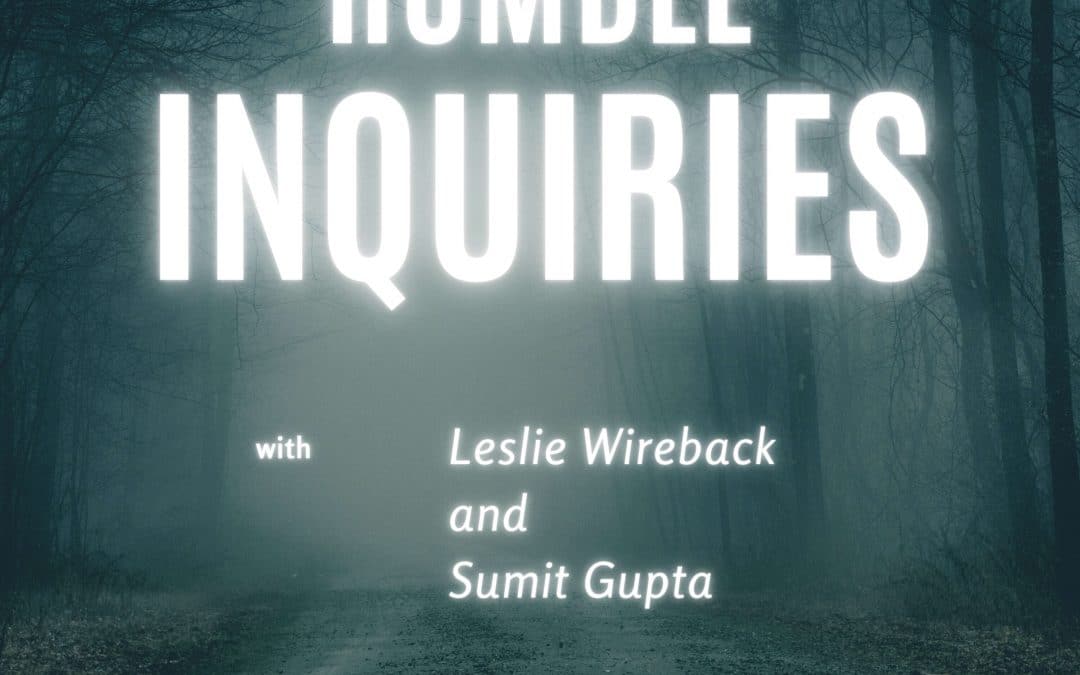This is the Humble Inquiries series. In this episode, Leslie joins me as my co-host to humbly inquire into coaching as a leadership skill – and a very timely one for leaders as we find ourselves in new ways of working. Co-hosted with Leslie Wireback on the Choosing Leadership podcast
In each episode of Humble Inquiries, we are deliberately going to put ourselves in the uncomfortable space of not knowing the answer and humbly inquiring about these challenges – with the aim to provoke new thoughts, actions, and practices – to help us better serve our coaching clients, and also to help the leader in you navigate the biggest challenges – at life and at work.
Show Notes
- Leslie – “Coaching helps people create lasting change and long-term impact and really is about empowering the coachee to create their own path forward.”
- Sumit – “A coach helps the coaches see where they want to go. What stands in their way. And once people see what stands in their way, they also know what to do about it,”
- Leslie – “one of my mentors always shared the beautiful analogy of, the Lily pads on the surface of the water. Beautiful flowers come from that, but they have. Come up from the deep murky bottom of the water to come through and shine their light as a beautiful flower. So sometimes what’s stopping an individual or getting in the way is it’s down there deep in the murky, muddy mess, and a coach can help go through there and part the way for the growth to move forward and for others to see that.”
- Sumit – “Coaching is showing people the mirror. And what happens when we see the mirror. is we get to see what we cannot see on our own.”
- Leslie – “you don’t need to spend years being trained as a coach. One of the keys is listening and asking questions and anyone can do that.”
- Sumit – “there is no one style of leadership which fits every person, every situation, every organization and coaching, I think, might be the leadership style of the future.”
- Leslie – “One of the most rewarding things in coaching is when you ask a question and the other person says, wow, that’s a really great question. Or I’ve never thought about that right there. It’s an opportunity for that person to change and look at something differently. “
- Sumit – “a fear-based management style can create compliance. It can create obedience. But it cannot create the kind of creativity and innovation that we require from our leaders today. And coaching can actually make that happen naturally. So as a style, coaching is not fear-based or not based on incentives, but getting somebody to connect very deeply with what is it that you care about and then how do you want to lead?”
- Leslie – “As the manager, you don’t always have all the answers often. They think you do because you’re in charge of the department, the function, whatever that may be, but you don’t have to have all the answers and you don’t have to have walked the journey before them. That’s where shifting into a coaching conversation really creates so many more possibilities because you don’t have to have the answer”
- Sumit – “What coaching does is basically allows or honours that there is more to being human than our brains and analytical minds and create space for all of those emotions to be expressed, honoured, acknowledged, and that immediately shifts the well being, because then that creates a space for listening.”
- Leslie – “You don’t know what you don’t know. And sometimes you really just need to experience it.”
- Sumit – “the kind of people I am coaching are high-level executives and leaders. What I’ve seen is the most use of coaching can be taken by high performers. People who are already performing or who are already ambitious, they can take their performance and the results they produce to a totally different level, a totally unheard-of level through the process of coaching.”
- Leslie – ” in those high performers, coaching is incredibly effective because they continually want to advance themselves. They always want to learn. They always want to do better.”
- Sumit – “every business team and every business leader will have a coach in the future because it’s quite natural that if something can help you move towards your future and you get more productive at the same time, and more happy and joyful. Why wouldn’t you have that resource why wouldn’t you avail of that?”
As quoted by Edgar Schein in his book Humble Inquiry, an humble inquiry is recognizing that insights most often come from conversations and relationships in which we have learned to listen to each other and have learned to respond appropriately, to make joint sense out of our shared context, rather than arguing with each other into submission.

